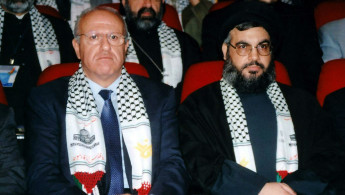Former Lebanese minister accused of 'terrorism' granted bail
Samaha's is accused of working with the Syrian regime to launch "terrorist" attacks in Lebanon. The case case is highly divisive in Syria, and the former minister's release has sparked immense debate in the country.
Samaha will be released on bail for 150 million Lebanese pounds ($100,000), but will not be allowed to leave the country for at least a year, speak to the press, or use social media.
His wife, Gladys Samaha, told AFP she was raising funds for the payment.
"I hope that he'll be back home today," she said.
Samaha's next court date is set for 21 January.
The ex-minister was arrested in August 2012 and charged with attempting to carry out "terrorist acts" in Syria.
It is alleged that he and Syrian security services chief Ali Mamluk transported explosives and planned attacks and assassinations of political and religious figures in Lebanon.
Samaha was sentenced in May 2015 to four-and-half years in prison.
Each judicial year equals nine months, which meant Samaha who has been in custody since August 2012 would have been eligible for release in December 2015.
However, in June Lebanon's Cassation Court nullified the verdict and ordered a retrial.
Samaha, a Christian politician and former adviser to Syrian President Bashar al-Assad, admitted during his trial that he had transported the explosives from Syria for use in attacks in Lebanon.
 |
During his trial Samaha argued he should be acquitted because he was a victim of entrapment. |  |
But he argued that he should be acquitted because he was a victim of entrapment.
His previous sentence was denounced as "scandalous" by Justice Minister Ashraf Rifi as it would have seen him released at the end of 2015 because of time served.
Social media users across the country also expressed outrage at the sentence handed out to the former information minister.
Syria maintained a nearly 30-year presence in Lebanon, withdrawing its troops in 2005 after the assassination of former prime minister Rafiq Hariri.
But a series of assassinations of prominent anti-Syrian regime figures in Lebanon followed the withdrawal.





 Follow the Middle East's top stories in English at The New Arab on Google News
Follow the Middle East's top stories in English at The New Arab on Google News
![The UAE is widely suspected of arming the RSF militia [Getty]](/sites/default/files/styles/image_330x185/public/2024-11/GettyImages-472529908.jpg?h=69f2b9d0&itok=Yauw3YTG)
![Netanyahu furiously denounced the ICC [Getty]](/sites/default/files/styles/image_330x185/public/2024-11/GettyImages-2169352575.jpg?h=199d8c1f&itok=-vRiruf5)
![Both Hamas and the Palestinian Authority welcomed the ICC arrest warrants [Getty]](/sites/default/files/styles/image_330x185/public/2024-11/GettyImages-2178351173.jpg?h=199d8c1f&itok=TV858iVg)